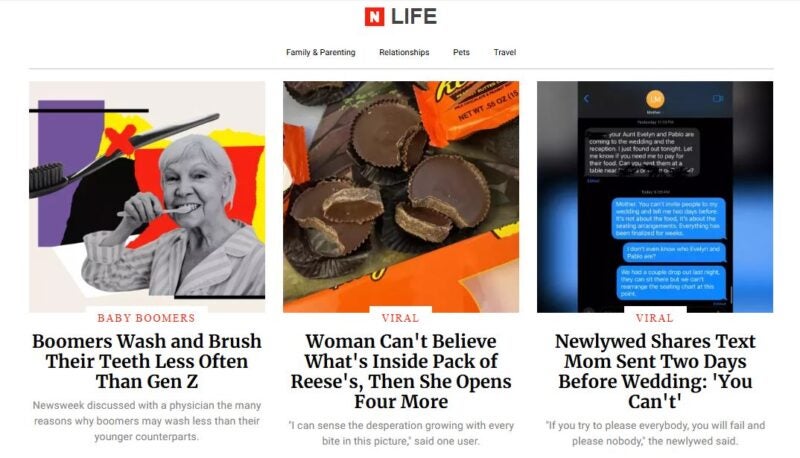
A traffic growth strategy aimed at maximising referrals from Google’s Search, Discover and News platforms has helped Newsweek become the fastest-growing English-language news site in the world.
The brand now boasts some 200 people in its news operation, its SVP of audience development Josh Awtry told Press Gazette, following growth in its politics, popular science and lifestyle teams.
Newsweek has charted as the fastest-growing English-language news site in the world on Press Gazette’s top 50 ranking almost every month this year. According to Similarweb its total web visits stood at 109.1 million in September, up 108% year-on-year, making it the 20th most-visited English language news site in the world and the 14th-most visited in the US, ahead of the Associated Press and CBS News.
“As revenue goes up, we’re reinvesting in our journalists, our journalism,” Awtry told Press Gazette last week. “We’ve tripled the size of our politics team over the past seven months.”
He added that the brand, which is co-owned by chief executive Dev Pragad and former chief executive Johnathan Davis, was “trying to hire in a really sustainable way”.
What’s behind Newsweek traffic growth?
Awtry told Press Gazette “the bulk” of Newsweek’s visits come from Google Search, Google Discover and Google News.
“We do listen very carefully to Google signals,” he said. “We don’t want to game the system. But if we’re seeing that there is increased and stable traction in a coverage area, that, to me, doesn’t mean gaming a system, that means readers are interested, they’re hungry for content in that area. So we will look at hiring staff looking for angles.”
Google Discover, he said, has “been a mainstay of where our audience comes from” during the year and a half he has worked at Newsweek. Discover is a personalised feed that is automatically presented to Google app users when they open an empty tab on their smartphone, and appears to have been growing as a source of referral traffic for publishers this year.
A Newzdash analysis published in August found Google Discover was driving 55.6% of Google traffic at the publishers assessed earlier this year, an increase of 14 percentage points on 2023.
“Our news content still does a solid job on Google Discover, but increasingly, a lot of our lifestyle content does well,” Awtry said. “If a person does something [and] it goes viral on social, we’ll reach out and talk to that person, and interview them, do that story — those sorts of stories, those real people and real voices do a good job for us on Google Discover…
“The signal there is don’t just pull more easy viral stories, but go try and get the story behind why it was viral.”
As well as Google Discover, Awtry said Newsweek had “really beefed up” its news SEO team in recent months, and that “we look at the signals from Google News much more carefully than we ever used to…
“I won’t say they have a hard and fast goal on it, but we definitely keep track of how many times Newsweek appears in the top Google News carousel, and we’re trying to grow that.”
But he emphasised that Newsweek’s page views have been growing faster than its unique user count, and page views per visitor have “basically doubled” from around 2 or 2.5 in two years.
“That’s a positive signal — we’re growing our direct readership,” he said. “The people are coming to us not via Google but via our own surfaces, whether that’s, bless their hearts, those people who bookmark newsweek.com — that’s great — but increasingly newsletters, push alerts.”

What does Newsweek’s content look like?
On Sunday 3 November, two days before the US presidential election, Newsweek published 140 articles, of which 62 (or 44%) covered sporting news or promoted partner sports betting services. Another 44 stories (31%) related to politics. The two types of content collectively accounted for three-quarters of the articles published on the site.
The remaining stories spanned health, science, weather and hard news, as well as softer lifestyle stories and rewrites of social media content.
The latter content resembles the fluffy viral lifestyle stories that were common online during the heyday of Facebook traffic referrals, running under headlines like “Rescued Cows Say Last Goodbye to Sick Friend in Heartbreaking Clip” and “Student Asks for Extra Mayo on Fries, Gets More Than She Bargained for“. As Awtry described, however, almost all those stories on Newsweek involve an interview with the originator of the viral content, whereas other publishers publish quick rewrites with no further work.
Other recurring themes in Newsweek’s content have included dogs, product recalls and the state of Texas. The site publishes daily articles aimed at helping people solve New York Times puzzles Wordle and Connections, and has published a few stories that centre on AI chatbot responses, for example “What a Second Donald Trump Term Would Look Like, According to ChatGPT, Grok” and “What ‘Yellowstone’ Fans Should Watch Next, According to ChatGPT“.
‘Our future is in using the traffic coming from Google as the start of an interaction, not the end result’
Asked whether Newsweek was concerned that it is overexposed to Google — which has been an unpredictable source of traffic for publishers in recent years — Awtry said: “Every publisher has to be concerned about that… anytime we’re fully beholden to someone else to bring us our new readers, that’s a risk.”
He added: “We really appreciate Google, we have a good relationship with Google, but we can't count on the fact that they will always be there sending readers to us.”
Citing Google’s previous disruptive algorithm changes and its ongoing deployment of AI Overviews, which are expected to hit publisher traffic referrals, Awtry said Newsweek tries to view the wave of visits from Google as “a gift", but not an end in itself.
The audience team he oversees has grown “significantly” he said, recently adding “a deeper tech stack to better understand segment and address readers” by offering them “custom experiences” which will, hopefully, keep them coming back in future.
“It's no different from what we do with any newspaper or any news site and their ad tech, serving the right ads to the right people,” he explained.
“If you've come in and it's your first time ever, let's not hit you with a pop-up to subscribe to Newsweek. Let's not even bother you about a newsletter. Let's just let you read the story you wanted to read.
“Second time back? Yeah, maybe we'll ask you if you're interested in the newsletter. If it's the third politics story you've read, on that visit, even if it's your first visit, yeah, we're gonna ask you about a politics newsletter.
“We're trying to get much more sophisticated in how we handle those lifecycle journeys. Sometimes the best way is to do nothing, but sometimes the best thing is to ask someone to just like us on social — or if they came from Reddit, acknowledge they came from Reddit.
“The tech stack for us is just coming into play over the past month, so they're new tools. But that, for us, is our future — is in using the traffic coming from Google as the start of an interaction, and not the end result.”
[Read more: 'Speed' and 'fairness' are key tactics for fast-growing Newsweek on US election night]
Newsweek looks to Reddit to acquire new readers away from Google
Awtry said Newsweek aims to differentiate itself from the competition in part through active engagement with its audience, which has manifested in a particular focus on its comment section and on Reddit. The site gets “thousands of comments a day, sometimes more than 10,000”, Awtry said, and “We just hired a new community manager whose job is not just to take down bad comments, but to really highlight the best of them, to feature them, to foster civil debate.”
Awtry credited the focus on Reddit in part to “wildly fluctuating” traffic from search engines.
“We're looking to diversify where our new readers come from. The bulk of them still come from Google related services — we can't always count on that. And so we started using Reddit a lot more.”
Reddit appealed, he said, because it was somewhere users interact with one another, and Newsweek uses it “heavily — not just posting all of our stories in the news subreddit or anything like that, but really trying to read the room of niche subreddits.
“If we do a story on Gen Z not being able to afford homes, we'll go to the Gen Z subreddit, we'll make sure we're okay to post there, we’ll put it there.”
He said Reddit would not work for publishers hoping to use it “as a page view driver”.
“We're using it as a reputational signal, as a brand signal, as a way of taking the pulse of how we're seen.”
[Read more: Platform profile — Why publishers must tread carefully to succeed on Reddit]
Email pged@pressgazette.co.uk to point out mistakes, provide story tips or send in a letter for publication on our "Letters Page" blog
